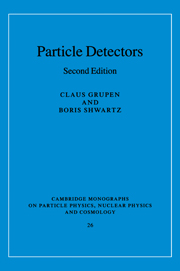Book contents
- Frontmatter
- Contents
- Preface to the second edition
- Preface to the first edition
- Introduction
- 1 Interactions of particles and radiation with matter
- 2 Characteristic properties of detectors
- 3 Units of radiation measurements and radiation sources
- 4 Accelerators
- 5 Main physical phenomena used for particle detection and basic counter types
- 6 Historical track detectors
- 7 Track detectors
- 8 Calorimetry
- 9 Particle identification
- 10 Neutrino detectors
- 11 Momentum measurement and muon detection
- 12 Ageing and radiation effects
- 13 Example of a general-purpose detector: Belle
- 14 Electronics
- 15 Data analysis
- 16 Applications of particle detectors outside particle physics
- Résumé
- 17 Glossary
- 18 Solutions
- Appendix 1 Table of fundamental physical constants
- Appendix 2 Definition and conversion of physical units
- Appendix 3 Properties of pure and composite materials
- Appendix 4 Monte Carlo event generators
- Appendix 5 Decay-level schemes
- Index
Résumé
Published online by Cambridge University Press: 19 October 2009
- Frontmatter
- Contents
- Preface to the second edition
- Preface to the first edition
- Introduction
- 1 Interactions of particles and radiation with matter
- 2 Characteristic properties of detectors
- 3 Units of radiation measurements and radiation sources
- 4 Accelerators
- 5 Main physical phenomena used for particle detection and basic counter types
- 6 Historical track detectors
- 7 Track detectors
- 8 Calorimetry
- 9 Particle identification
- 10 Neutrino detectors
- 11 Momentum measurement and muon detection
- 12 Ageing and radiation effects
- 13 Example of a general-purpose detector: Belle
- 14 Electronics
- 15 Data analysis
- 16 Applications of particle detectors outside particle physics
- Résumé
- 17 Glossary
- 18 Solutions
- Appendix 1 Table of fundamental physical constants
- Appendix 2 Definition and conversion of physical units
- Appendix 3 Properties of pure and composite materials
- Appendix 4 Monte Carlo event generators
- Appendix 5 Decay-level schemes
- Index
Summary
Measure what is measurable, and make measurable what is not so.
Galileo GalileiThe scope of detection techniques is very wide and diverse. Depending on the aim of the measurement, different physics effects are used. Basically, each physics phenomenon can be the basis for a particle detector. If complex experimental problems are to be solved, it is desirable to develop a multipurpose detector which allows one to unify a large variety of different measurement techniques. This would include a high (possibly 100%) efficiency, excellent time, spatial and energy resolution with particle identification. For certain energies these requirements can be fulfilled, e.g. with suitably instrumented calorimeters. Calorimetric detectors for the multi-GeV and for the eV range, however, have to be basically different.
The discovery of new physics phenomena allows one to develop new detector concepts and to investigate difficult physics problems. For example, superconductivity provides a means to measure extremely small energy depositions with high resolution. The improvement of such measurement techniques, e.g. for the discovery and detection of Weakly Interacting Massive Particles (WIMPs), predicted by supersymmetry or cosmological neutrinos, would be of large astrophysical and cosmological interest.
In addition to the measurement of low-energy particles, the detection of extremely small changes of length may be of considerable importance.
- Type
- Chapter
- Information
- Particle Detectors , pp. 510 - 511Publisher: Cambridge University PressPrint publication year: 2008



